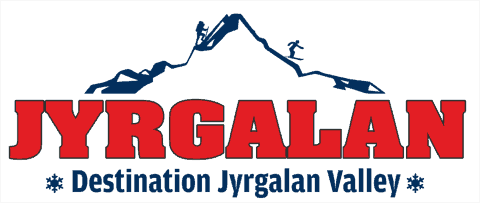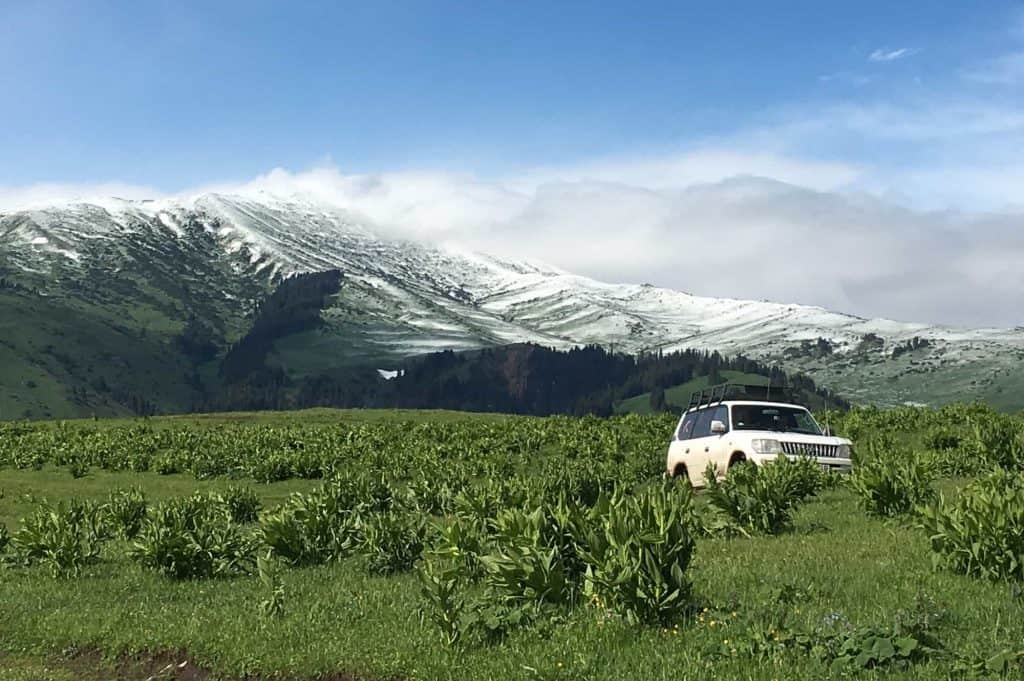Kyrgyz Food
Eating in Jyrgalan.
At first glance, the country’s nomadic history appears to have shaped modern Kyrgyz cuisine — it’s heavy on the meat and dairy that nomadic herders have readily available. But the story does not stop there. Kyrgyzstan was a pivotal thoroughfare on the Silk Road, and as such the country’s food shows cultural influences and flavors from the diverse traders and merchants who plied the route for centuries. This means you’ll find dishes adapted from other cultures — Uighur, Dungan, Uzbek, Turkic, and Russian, to name a few — alongside one another on Kyrgyz dinner tables across the country.
Eating in Jyrgalan Village
In Jyrgalan, you’ll have the unique opportunity to dine on a range of classic, home-cooked Kyrgyz dishes prepared by your guesthouse. There are no restaurants or and only a few small shops in the village, so each guesthouse offers three meals a day. Breakfast is included in the price of each night’s stay, and meals are set at a price of 650-850 KGS for lunch or dinner. If you are organizing a day-trek, horseback ride, or mountain biking adventure, your accommodation can provide a picnic lunch for 400 KGS.
If you require additional snacks or food, you should purchase these items before you arrive in Jyrgalan (e.g., in Karakol). Alternately, if you need a few small items, these shops carry some basics:
- Nadina's Shop; location here
- Rahat's Shop; location in guest house Rahat
- Bermet's Shop; location near bus station
Eating Vegetarian or with Dietary Restrictions
If you are vegetarian/vegan/celiac or have special dietary needs, please let your guest house owner know in advance (at least 4 hours) so they can prepare special meals for you. Many guesthouse owners received hospitality training during Destination Jyrgalan’s inception, so owners are sensitive to and understanding of dietary restrictions and can adapt traditional dishes to meet a reasonable range of dietary restrictions. You should notify your host of food allergies and restrictions when you book your accommodation.
Note: Fluent English-speakers are not readily available in the village. If you have very serious food restrictions and life-threatening allergies, please be proactive and carry a printed card with these allergies translated into Russian Cyrillic.
Kyrgyz Dishes
The following dishes are a sampling of the traditional Kyrgyz food that hosts in Jyrgalan may prepare for guests. If you wish to try a specific dish, this can sometimes be arranged if you ask your host with at least four hours notice. (Hosts reserve the right to prepare meals that best adapt to the needs of all guests enjoying the meal together.)
Dumplings
Kyrgyz cuisine has no shortage of delicious dumplings in a dizzying array of styles. Manti is popular throughout the region, and locals most often enjoy these filled with meat (beef or yak), potato, pumpkin, or dzushai (greens). Once you’ve sampled traditional manti, opt for vareniki, a purely vegetarian, pierogi-like dumpling filled with mashed potatoes or cabbage. Then there’s chymchyma, an assemble-your-own dish served with thin pasta squares and accompanied by a plate of tender minced beef and vegetables (carrots, onions, cabbage). Further still, locals love chini-manti — a manti dumpling slow-cooked in its own bowl in a traditional oven. One manti, one bowl. Chini-manti are served with a delicious spiced tomato sauce and sided with various salads. All dumpling dishes can be easily prepared vegan or vegetarian.
Laghman and Ganfan
These Dungan-inspired dishes are basically the same dish served in two different styles. You’ll enjoy a spicy meat and vegetable sauce served over either rice (ganfan) or hand-pulled noodles (laghman) that are unique to this region. Both dishes offer a flavorful and hearty meal that can be easily served as a vegetarian dish — upon request in advance.
Oromo
This beloved Kyrgyz dish is a regular staple on tables throughout Jyrgalan village. Made from layers of handmade dough, oromo is then filled with cabbage and carrots (vegetarian version) or small bits of meat and onions (meat-eater version). Once filled, it’s rolled into a roulette and cooked in a special pan. Each chef has their own style of preparation, so it’s a real treat to try a variety of oromo while in Kyrgyzstan.
Beshbarmak and Gulchitai
Eat like a nomad with these lamb or beef noodle dishes. Beshbarmak is the traditional Kyrgyz dish; meat is cooked in its own juices for hours, then poured over hand-cut noodles. This is a fork-optional meal, as your food is meant to be blended and then eaten with your hands. Beshbarmark makes for a hearty and tasty meal before or after your trek. Gulchitai is made from similar ingredients, but the preparation process differs. Long, handmade noodles are layered together with chunks of meat and various greens, and smothered with a tasty meat broth.
Plov
This dish is a Central Asian favorite featuring slow-cooked chunks of beef, carrots, and onions on a bed of rice. Plov is served with a delicious side-dish of shakarap, a simple salad composed of onions, tomatoes, and seasonings marinated together. Vegetarian plov is typically served with an interesting and seasonal mix of apricots and various nuts and spices.
Kuurdak
Enjoy the delightful blend of flavors and spices in kuurdak, a hearty dish made from fried marinated meat, onions, and potatoes. It’s a warm and homey meal that is most often enjoyed in the winter months.
Soups
Our hearty soups are delicious year-round, but are a particularly wonderful way to warm up after an outdoor winter adventure. Soup options are rotated regularly, but a few favorites include: lentil soup, shorpo, borscht, bean soup, and more. With the exception of shorpo, all soups are vegetarian optional.
Samsa
Reminiscent of Indian samosas, samsa makes a perfect snack any time of the day and are easy to pack and enjoy on a trek as well. Stuffed with onions and lamb (or potatoes/greens for vegetarians), these savory stuffed pastries are baked until they’re lightly golden on top and are sometimes sprinkled with sesame seeds for an additional dash of flavor.
Kymyz
You shouldn’t leave Kyrgyzstan without trying kymyz, a drink made from fermented mare's milk that is well-loved across the country. With a signature jolt of tanginess that some consider an acquired taste, the flavor most resembles drinks like kefir or Ayran from Turkic and Central Asian cultures. Kymyz is claimed to confer a range of health benefits to those who consume it. Jrygalan is the perfect location to undergo a called kymyz treatment, a process intended to support digestive health. Learn more about kymyz here. (Photo courtesy of Baytur.kg)



